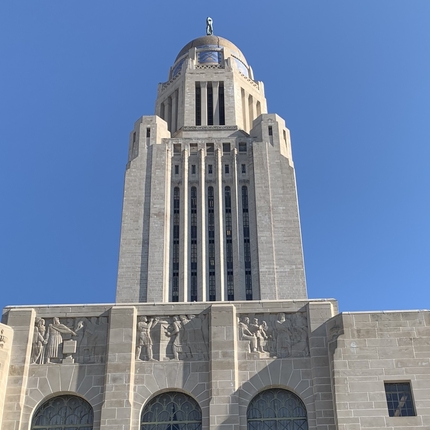Carlie Jonas, policy associate, carliej@cfra.org, 402.687.2100, ext. 1032; Teresa Hoffman, senior communications associate, teresah@cfra.org, 402.687.2100, ext. 1012
LINCOLN, NEBRASKA – Supporters wanting to ensure Medicaid recipients have equitable access to health care and that families continue to receive the assistance they need to put food on the table appeared before the Nebraska Legislature’s Health and Human Services Committee this week, seeking the advancement of two bills.
Center for Rural Affairs staff were among the supporters offering testimony on Legislative Bills (LB) 62 and 84.
Introduced by Sen. Machaela Cavanaugh, LB 62 would require the state to accept the federal funding now available to provide translation and interpretation services for Medicaid recipients. It directs the Nebraska Department of Health and Human Services to maximize the federal funding available to cover these costs.
In testimony before the committee on Wednesday, Center Policy Associate Carlie Jonas said the federal cost-sharing reimbursement for these services is 60%, with the state covering 40%. However, there is no mandate for states to use the federal funds.
“This is especially disadvantageous for rural clinics that do not have the budgets to cover these excess costs,” she said. “To fill the translation gaps, often these clinics turn to family members, including children, bilingual staff who take time away from their regular responsibilities to provide translation, or free online tools like Google Translate, which are not 100% accurate and result in more confusion and frustration for patients and providers.”
Jonas said when a patient cannot effectively communicate with their doctors, unnecessary tests and treatments may be given.
“When these services are accessible, patients have a better understanding of their diagnosis, are more able to follow their treatment plans, have a better understanding of information and test results, and are able to schedule appointments,” she said.
Cavanaugh said LB 62 is a needed step to ensure everyone receives the health care they need even if English is not their first language. She said it would impact rural health care more than anybody else.
“Evidence indicates increased access to interpretation services improves satisfaction, shortens admissions, and reduces the likelihood of adverse events,” she said.
Sponsored by Sen. Jen Day, LB 84 would keep the gross income eligibility requirement for the Supplemental Nutrition Assistance Program (SNAP) at 165% or below the federal poverty level. The Legislature increased the threshold to this level in 2021 as a way to fix a flaw known as the “cliff effect,” however, this change is set to expire on Sept. 30.
In 2021, more than 157,000 Nebraska’s received SNAP benefits—72% were part of a family with children, while 30% were in households with seniors or people with disabilities.
Testifying before the committee on Thursday, Center Policy Associate Derrik Conard said in an economy where food prices continue to increase, rural Nebraskans are feeling the pressure.
“As a resident of Scotts Bluff County, I’ve seen firsthand the benefits the Supplemental Nutrition Assistance Program has for my neighbors and their families,” he said. “Sixty-eight percent of the population in our county qualify for SNAP under the gross income eligibility limits that are now in place.”
There are similar eligibility numbers in surrounding counties, he said. Garden County is the highest at 77%; Lincoln County’s is 61%, while Sheridan and Keith counties are 69% and 61% respectively. In comparison, 59% of the residents living in Douglas County qualify for SNAP benefits.
Additionally, SNAP spending helps rural grocery stores stay in business, he said.
“Every household enrolled in SNAP results in additional federal dollars brought into the state to address food insecurity,” Conard said. “Economists estimate that for every one of these dollars spent, about $1.70 in economic activity is generated.”
Day said one of the most important impacts of an increased SNAP gross income limit is that it addresses the SNAP cliff effect.
The cliff effect occurs when a beneficiary reaches a certain threshold of income that causes them to lose their assistance, but not to make enough money to replace the benefit, resulting in a net loss in income. This anomaly discourages employees from accepting promotions or finding better work.
“It makes sense to pass LB 84 to not only support working Nebraskans trying to get ahead but to stimulate the economy by eliminating the cliff effect and injecting millions into local businesses and producers,” she said.





